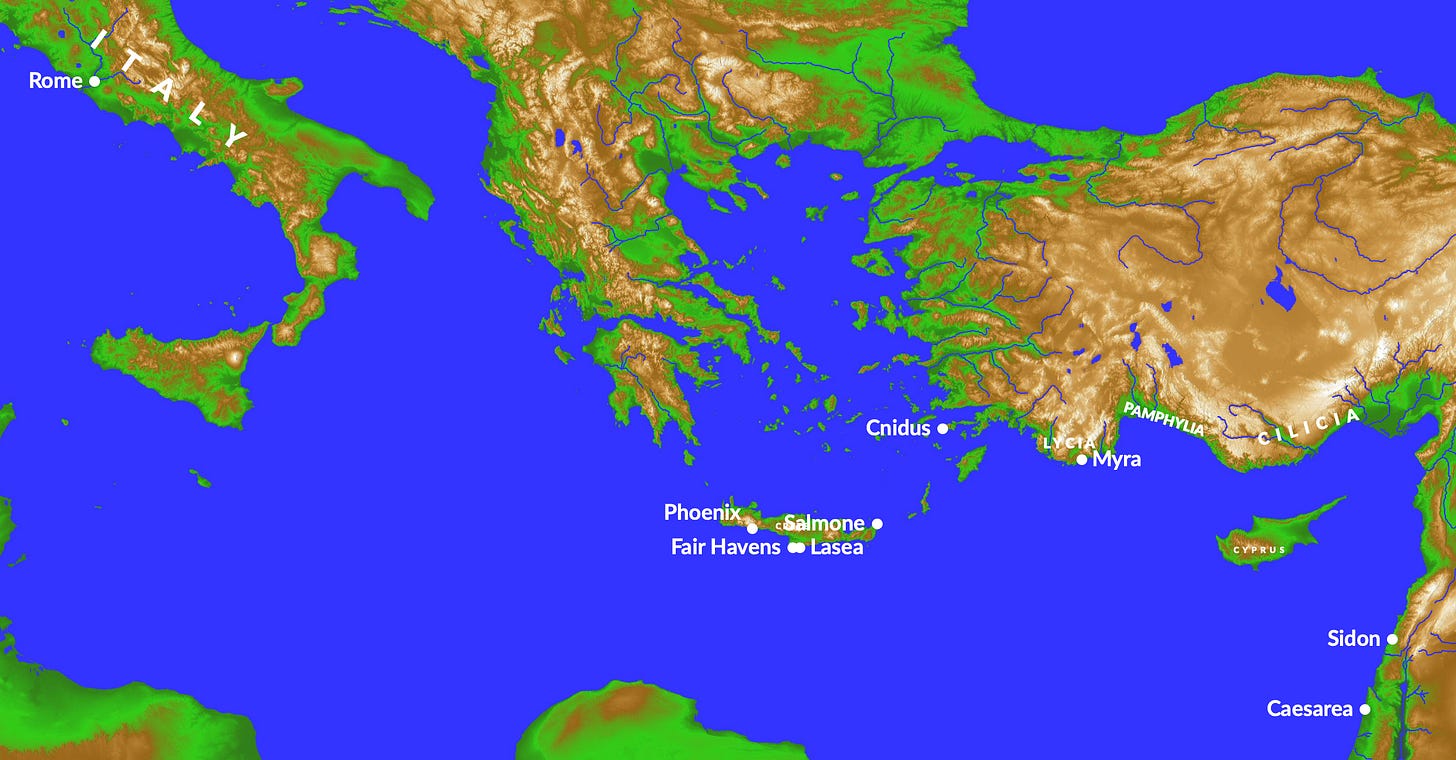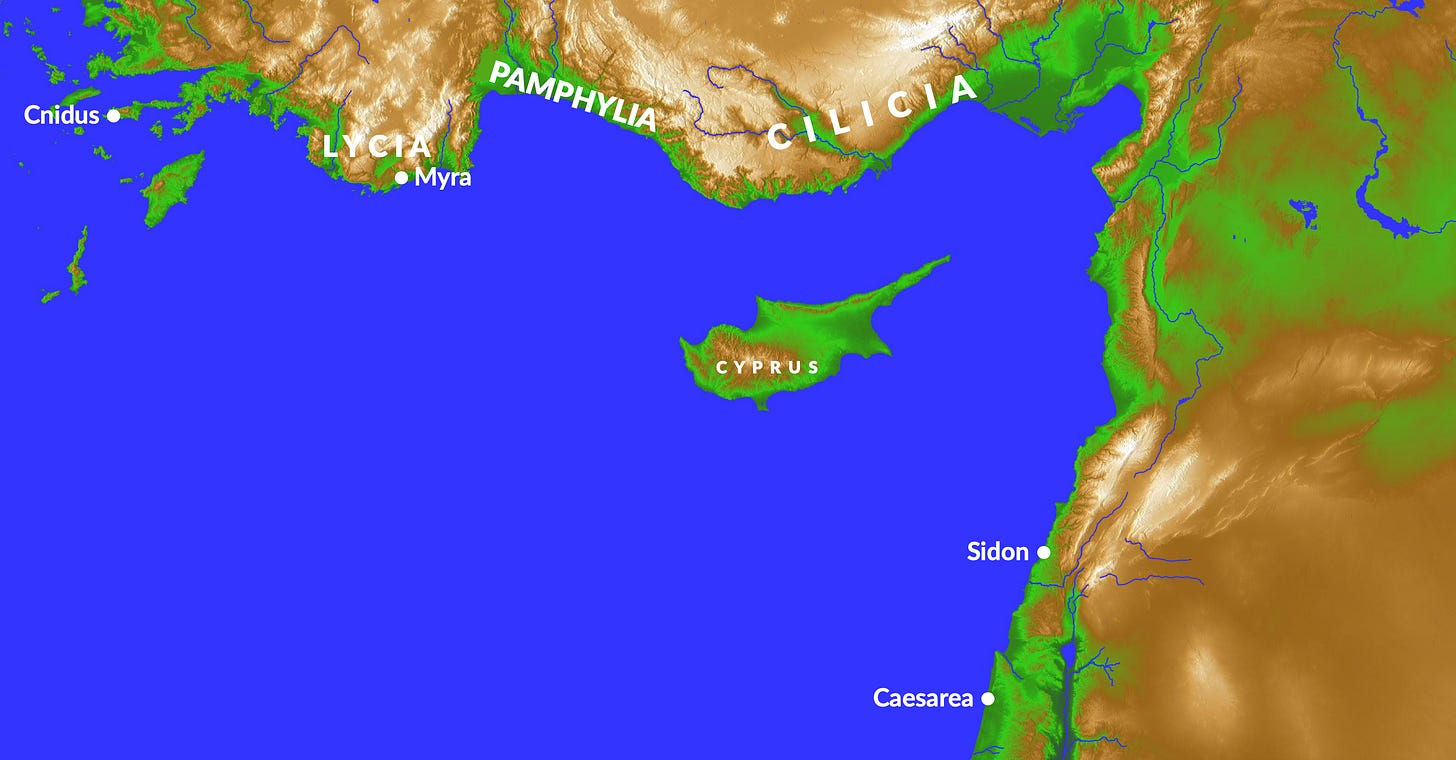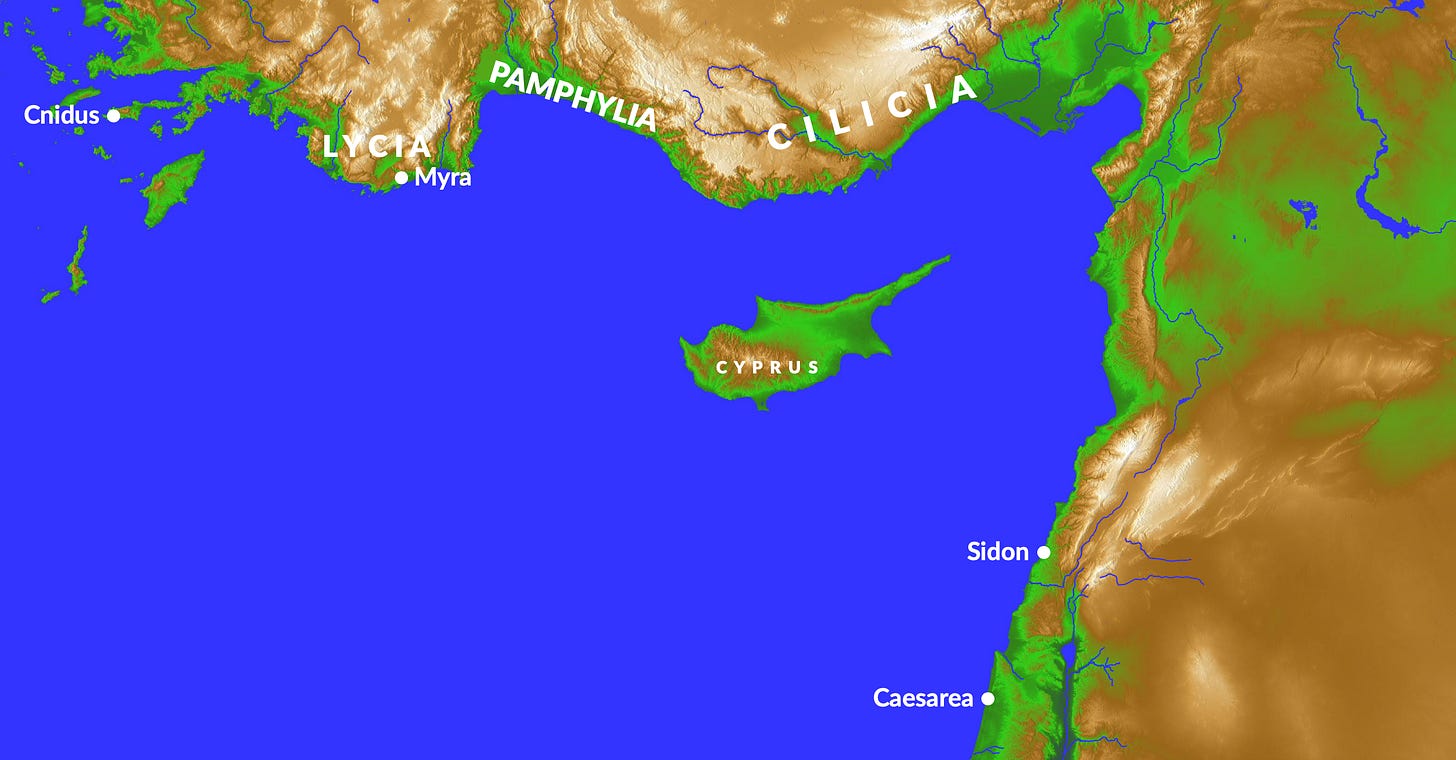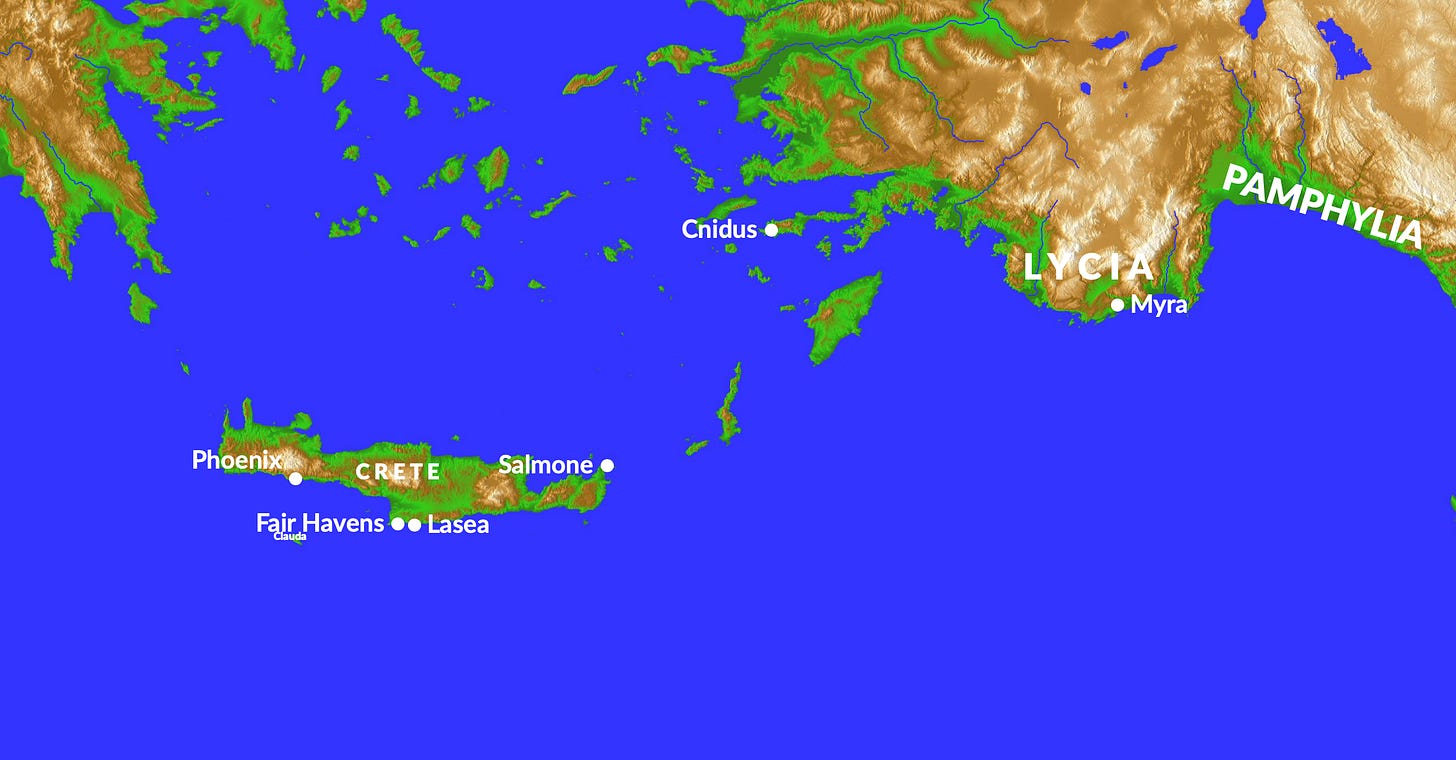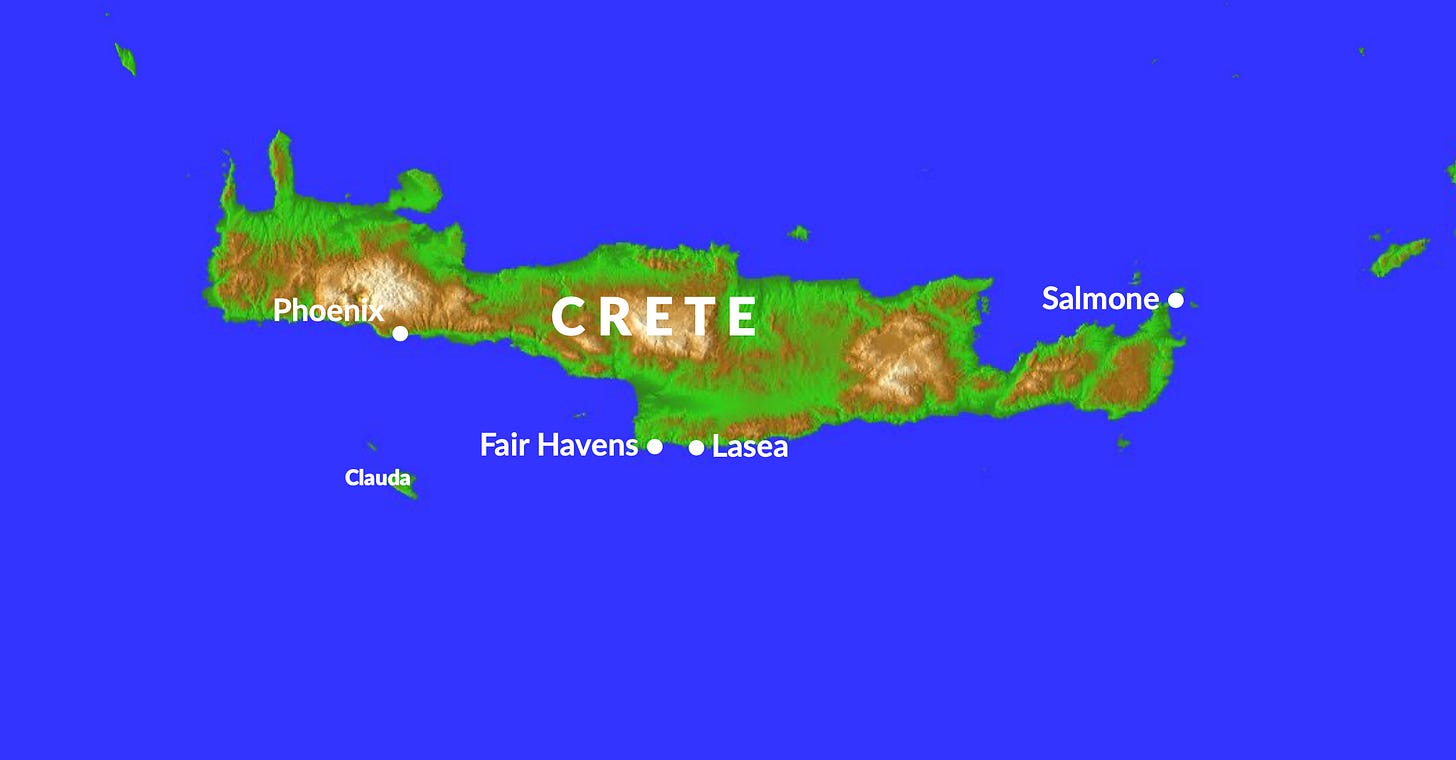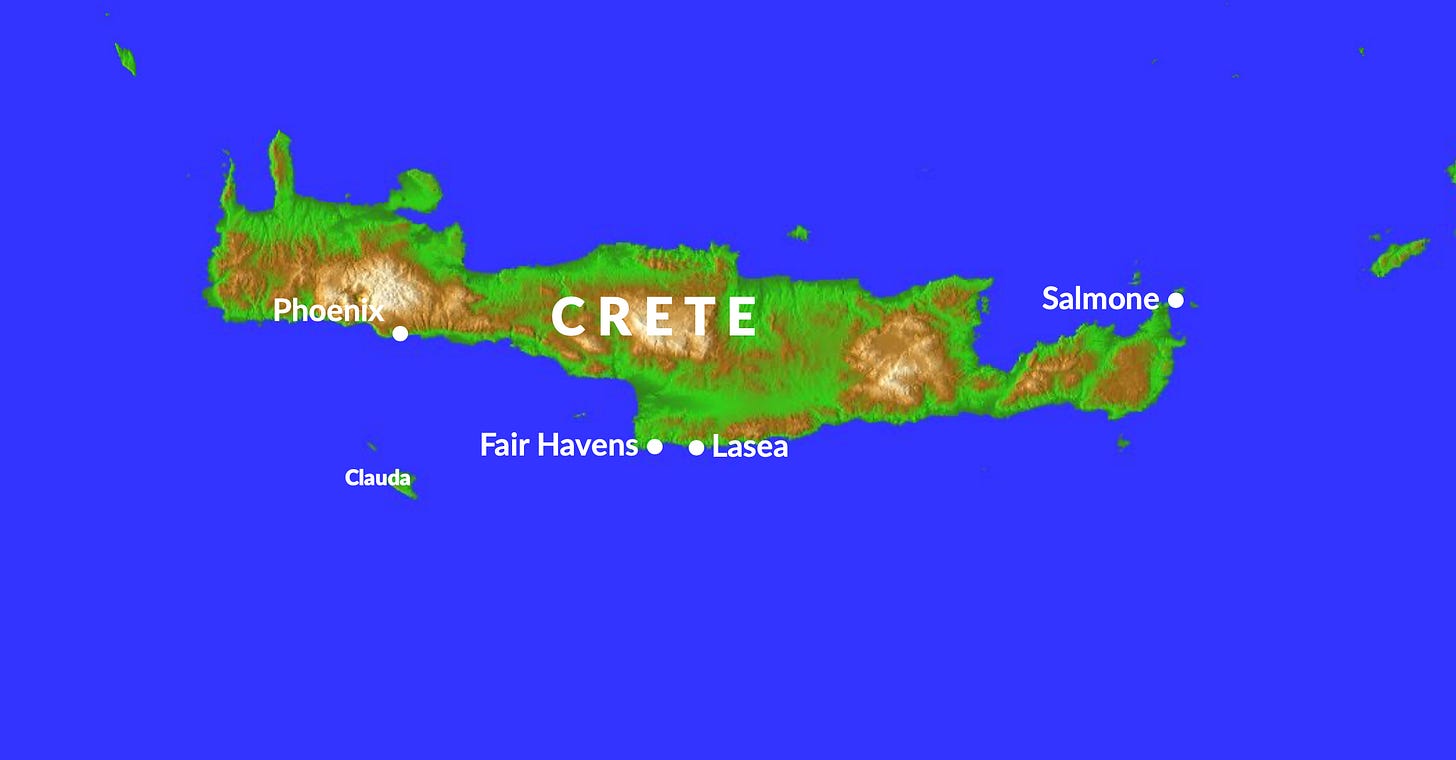Daily Scripture Reading Acts 26:27 - 27:17
As we go through life, we have to make many decisions and choices, which means people need to have some sort of basis for making those decisions. Many times people do whatever the majority of people are doing. It is also quite common for humans to follow their emotions and feelings when choosing between various options. Another technique for deciding on the next step in life is often called the open door, which means if it is possible to do something, then that course of action is probably correct.
Today, we are going to read about a time when the majority had an open door to do what their emotions wanted them to do. However they very quickly learned they had made the wrong choice.
The 26th chapter of Acts records Paul’s address to King Agrippa. Paul began by recounting how he had grown up in Jerusalem as a Pharisee, persecuted the church, saw a bright light on the way to Damascus, and then was sent by God as a witness to the Gentiles. Paul told Agrippa that the suffering, death, and resurrection of Jesus was predicted by Moses and the Prophets.
Acts 26:27 King Agrippa, do you believe the Prophets? I know you believe.”
Acts 26:28 But Agrippa replied to Paul, “In such short time are you persuading me to become a Christian?”
Acts 26:29 And Paul said, “I would pray to God, that whether in a short or long time, not only you, but also all who hear me this day, might become such as I am, except for these chains.”
Acts 26:30 ¶ And the king stood up and the governor and Bernice, and those who were sitting with them,
Acts 26:31 and when they had gone aside, they began talking to one another, saying, “This man is not doing anything worthy of death or imprisonment.”
All through Acts 24 - 26, there were multiple times the Roman authorities recognized Paul was not doing anything the Romans considered worthy of death.
Acts 26:32 And Agrippa said to Festus, “This man could have been set free if he had not appealed to Caesar.”
This was a catch-22 for Paul. Since he had appealed to Caesar he could not be released, but if he had not appealed to Caesar, he may have been sent to Jerusalem for trial in front of a biased court, assuming he was not killed by the Jews on the way to Jerusalem.
Acts 27:1 ¶ Now when it was decided that we would sail for Italy, they proceeded to deliver Paul and some other prisoners to a centurion of the Augustan cohort named Julius.
Rome was at least 1,300 miles / 2,100 km away from Caesarea.
Acts 27:2 And getting aboard an Adramyttian ship, which was about to sail to the regions along the coast of Asia, we set sail accompanied by Aristarchus, a Macedonian of Thessalonica.
Acts 27:3 The next day we put in at Sidon, and Julius treated Paul with consideration and allowed him to go to his friends and receive care.
Note the phrase “The next day”. Apparently it only took a day to sail from Caesarea to Sidon.
It is about 80 miles / 125 km from Caesarea to Sidon. Acts 27:4 And from there we set sail and sailed under the shelter of Cyprus because the winds were against us.
Acts 27:5 And when we had sailed through the sea along the coast of Cilicia and Pamphylia, we landed at Myra in Lycia.
Their destination was Myra, which was northwest of Caesarea, but that meant sailing into the wind so they went east of Cyprus so the island could block the wind. Then they sailed along the coast of Cilicia and Pamphylia.
Acts 27:6 There the centurion found an Alexandrian ship sailing for Italy, and he put us aboard it.
Acts 27:7 And when we had sailed slowly for a good many days, and with difficulty had arrived off Cnidus, since the wind did not permit us to go farther, we sailed under the shelter of Crete, off Salmone;
Note the words “slowly” and “difficulty”. They were sailing west, but the winds were coming from the west, so it was hard to make progress.
Acts 27:8 and with difficulty, we sailed past it and came to a place called Fair Havens, near which was the city of Lasea.
When they reached Cnidus, they wanted to keep going west, but since the wind was against them they turned south and went east and south of Crete so that the island of Crete would shelter them from the wind. They finally arrived at Fair Havens.
Acts 27:9 ¶ And when considerable time had passed and the voyage was now dangerous, since even the Fast was already over, Paul began to advise them,
Acts 27:10 and said to them, “Men, I perceive that the voyage will certainly be with damage and great loss, not only of the cargo and the ship, but also of our lives.”
Verse 9 tells us it was the time of year when sailing was dangerous, so Paul advised everyone the prudent choice was to wait until it was safer to proceed.
Acts 27:11 But the centurion was being more persuaded by the pilot and the captain of the ship than by what was being said by Paul.
Acts 27:12 And because the harbor was not suitable for wintering, the majority reached a decision to set sail from there, if somehow they could arrive at Phoenix, a harbor of Crete facing southwest and northwest, to spend the winter there.
The phrase “not suitable for wintering” explains why they proceeded. They were not in a hurry to arrive in Rome so much as they wanted a better place to be while they waited for better sailing weather. In other words, they followed their emotions rather than their brain.
Pay attention to the word “majority”. Paul’s opinion was outnumbered.
They were in Fair Havens and wanted to spend the winter in Phoenix. It was only 45 miles / 75 km from Fair Havens to Phoenix, which in good weather could have been traversed in a day.
Acts 27:13 ¶ And when a moderate south wind came up, thinking that they had attained their purpose, they weighed anchor and began sailing along the shore of Crete.
The phrase “thinking that they had attained their purpose” tells us the majority, which had already made an emotional decision to sail on, thought the south wind was proof that their decision to sail on was a good decision.
Acts 27:14 ¶ But before very long there rushed down from the land a violent wind, called Euraquilo;
Acts 27:15 and when the ship was caught in it and could not face the wind, we gave way to it and let ourselves be carried along.
At this point the crew had no control over the ship, and they were at the mercy of the wind.
It is human nature to assume the majority is correct. However, in this case the majority was wrong. Paul was right because he did not listen to the majority, nor was he persuaded by any emotional desire to get to a better winter harbor. Instead, Paul used logic and intelligence to conclude it was not safe to keep sailing, and he was proven correct.
Also, people often make decisions based on whether there is an open door to do something. In this case a south wind came up, which was an open door to keep sailing, but events proved the majority should have used their brains to conclude that it was not wise to proceed even though the door was open to proceed.Acts 27:16 And running under the shelter of a small island called Clauda, we were scarcely able to get the ship’s boat under control.
The word “scarcely” indicates the difficulty the crew was having in doing anything to control the ship.
Clauda is south of Phoenix, showing the wind was blowing them away from their destination.
Acts 27:17 After they had hoisted it up, they used supporting cables in undergirding the ship. Fearing that they might run aground on the shallows of Syrtis, they let down the sea anchor and in this way let themselves be carried along.
At this point the crew had no control over the ship. All they could do was wait until the wind stopped.
It is quite common for people to go along with the majority and make emotional decisions, especially when there is an open door to do so. However, this journey proves that many times the majority is wrong and allowing emotions to override intelligence and wisdom is also a foolish thing to do.
What are some examples in your life where the majority was wrong?
How have feelings and emotions clouded your decision-making in the past?
What open door did you walk through, only to learn it was a mistake?
What can you do to avoid falling into the trap of wrongly following the majority, your emotions, or open doors?
Thanks for visiting Bible Mountain. If you have already joined my email list, thank you and please tell others about Bible Mountain. If you have not joined my email list yet, please do so now. In order to join, go to Bible Mountain dotcom, click on subscribe, and that will take you to a page where you can sign up. Your email address will not be sold nor given away. Once again, thanks for visiting Bible Mountain.
“Scripture quotations taken from the (LSB®) Legacy Standard Bible®, Copyright © 2021 by The Lockman Foundation. Used by permission. All rights reserved. Managed in partnership with Three Sixteen Publishing Inc. LSBible.org and 316publishing.com.”

